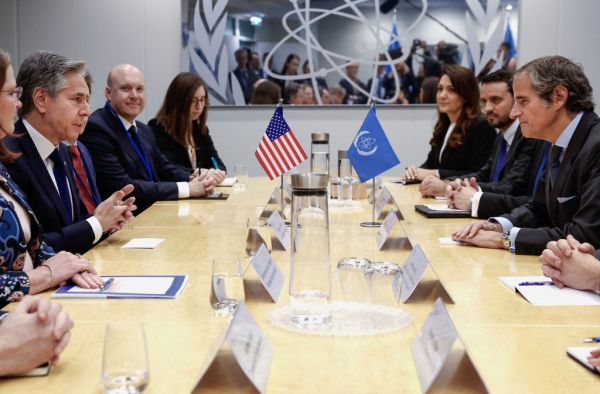The United States and Israel share a goal of keeping Iran from being a nuclear state, but the two nations have undertaken vastly different measures to achieve that aim. In 2016, Barack Obama sent pallets of cash to Iran as part of a $1.7 billion ransom for five American hostages, which happened to coincide with the implementation of the Joint Comprehensive Plan of Action (better known as the Iran nuclear deal). He also pardoned Iranian prisoners held in the United States. Naturally, Iran proceeded to take more hostages. Some of them are now coming home after Joe Biden agreed to pay a $6 billion ransom.
And plans are in the works to release up to $10 billion more of frozen Iranian assets. A lighter touch on the enforcement of oil sanctions has led to a surge of Iranian exports, bringing in billions each month. There is no acknowledged quid pro quo, yet all signs point to an informal nuclear deal under which Iran will not produce weapons-grade uranium. The White House needs the deal to stay informal, because U.S. law gives Congress the right to review any agreement. Such a flimsy deal makes no sense strategically, but it does allow the president to avoid the embarrassment—just ahead of a tough reelection fight—of Iran reaching the nuclear threshold despite 30 years of American promises it never would.
Israelis, meanwhile, are shaking their heads at Biden’s giveaways. Fully appreciating the depth of Iranian hostility toward the Jewish state and the West, Israel has spent more than a decade sabotaging the Iranian nuclear program. Many Israeli exploits have become public knowledge, thanks both to journalists and to the government’s desire to advertise its successes. Yet until now, no book has put all the pieces of the story together while adding new information derived from high-level sources within the Israeli government.
To understand the Israeli campaign from the perspective of its architects, the indispensable source is Target Tehran: How Israel Is Using Sabotage, Cyberwarfare, Assassination—and Secret Diplomacy—to Stop a Nuclear Iran and Create a New Middle East by Yonah Jeremy Bob and Ilan Evyatar, a pair of investigative journalists with The Jerusalem Post. The authors had access to three former directors of Mossad, two former prime ministers, and numerous other senior officials. The source who guides readers through much of the story is Yossi Cohen, director of Mossad from 2016 through 2021, who oversaw the stunning theft of more than 100,000 documents from the nuclear archive hidden in a non-descript warehouse on the outskirts of Tehran. Prime Minister Benjamin Netanyahu revealed that operation to a global audience in the spring of 2018, but Target Tehran brings new details to light.
The book notes that Mossad usually appoints a project manager for high-profile operations, but Cohen decided to run this one personally. No one in Israel knew where the archive was hidden, but Mossad agents found it within a month of Cohen taking over. When the agency hit a roadblock in its surveillance, Cohen chose to send in a female agent who spoke fluent Farsi and had an engineering degree, giving her the technical know-how to pick up on details her colleagues had missed. Mossad also sent an agent to pose as her husband, lest she draw attention as a single woman in a very conservative setting.
While planning the operation in 2016, the Israelis kept it secret from the United States. That changed when Donald Trump took office the next year. Cohen got along famously with his counterpart at the CIA, Mike Pompeo, who later became secretary of state. As Pompeo told Bob and Evyatar, “Whenever Yossi called, I took it.” Netanyahu went public with the results of the Tehran heist in late April 2018, about three months after it took place. Trump withdrew from the JCPOA the following month, but the book insists that the contents of the nuclear archive are not what changed his mind. Rather, his response to Netanyahu and Cohen’s presentation was to wave at his advisers and say, “Maybe they needed to see this. I didn’t. I’ve already decided to leave the deal.”
The contents of Iran’s nuclear archive pointed the Israelis to previously unknown sites that would soon become their targets, yet more than two years would pass before the assault began. Political constraints, not lack of opportunity, held Mossad back. Cohen was “practically salivating over the holes he knew existed” in Iranian security. Yet it was “unthinkable” for Mossad to strike while Western countries and the International Atomic Energy Agency—the U.N.’s nuclear watchdog—still credited Tehran with playing by the rules of the 2015 nuclear deal. Yet on June 19, the agency’s board of governors formally condemned Iran. That was the green light Israel needed. “From June 25 until July 19, the Islamic Republic’s facilities were pummeled almost nonstop by more than ten mysterious explosions, fires, and other accidents.”
Israel’s targets included a missile production facility and a uranium enrichment site, as well as power stations and industrial complexes. Iranian counterintelligence efforts seemed paralyzed. But the most dramatic blow would come in November 2020 with the killing of Mohsen Fakhrizadeh, the figurative father of Iran’s nuclear program. “His assailants knew his travel routes, his schedule, and details about his security,” the authors write. Mossad’s weapon of choice was a remote-controlled machine gun “that had been doctored to work by an operator thousands of miles away using facial recognition technology to zoom in” on Fakhrizadeh. The weapon was so accurate that it left Fakhrizadeh’s wife untouched, even though she was sitting just 10 inches away in the same car. Avoiding her death was a priority that informed the design of the entire operation.
As a reader, it is hard not to be amazed by Mossad’s exploits. Yet the book is far from being a mash note to an already legendary spy agency. Its authors are clearly impressed by the clandestine operations they describe but insist on asking whether Israeli efforts have actually held back the Iranian nuclear program. In that vein, the book notes that Fakhrizadeh had been in the crosshairs for more than a decade. Former Israeli Prime Minister Ehud Olmert told the authors that three separate operations came close to taking him out but were called off at the last moment. From a tactical perspective, the operation that finally eliminated Tehran’s nuclear chief was a stunning demonstration of Mossad’s precision and reach. Strategically, it was more of a question mark. Fakhrizadeh was an exceptionally talented manager who had won the trust of Supreme Leader Ali Khamenei over the course of decades. Yet by the time of his death, Fakhrizadeh had built a program that would outlive him and passed on much of his essential knowledge to younger scientists and executives. Had Israel struck a decade earlier, the impact might have been far greater.
Iran has also demonstrated a capability to recover from attacks that has sometimes stunned the Israelis. In the spring of 2021, Israel learned that the uranium enrichment facility it damaged extensively the previous year was back in operation, an achievement that seemed “almost impossible.” Undeterred, Israel struck the facility again. A top Iranian nuclear scientist commented on the attack that “the design of the enemy was very beautiful.” Mossad appreciated the compliment. Yet beautiful as the attack may have been, the Iranians recovered quickly once again.
In March 2021, Israel’s fourth election in two years brought to power a fractious coalition government led by Naftali Bennett, ending Netanyahu’s historic 12-year run as prime minister. Cohen retired from the Mossad only days before the new government took over, handing the reins to his deputy, David Barnea. Bennett and Barnea moved immediately to hit Iran even harder. Cyberattacks complemented physical ones, although Israeli officials are much more tight-lipped about that subject, leaving open the possibility that dissident groups were responsible. One high point of the Bennett-Barnea campaign came in February 2022, when Iran attempted to hit targets inside Israel with a pair of suicide drones launched by proxies in Iraq. The attack failed and Israel hit back in less than 24 hours, destroying 125 drones parked at a base in western Iran. Again and again, the Israelis demonstrated they could penetrate Iran’s defenses. For the most part, Iran proved incapable of hitting back, except in the cyber domain, where it surprised Israel with its ability to hack private sector firms, including the insurance giant Shirbit, whose files contain personal information on thousands of military personnel.
The question that remains open at the conclusion of Target Tehran is whether Mossad’s tactical wizardry adds up to strategic success in the shadow war with Iran. The authors give a very respectful hearing to skeptics—such as former Mossad director Tamir Pardo—who believe the country should have embraced the 2015 nuclear deal with Iran. Bob and Evyatar reject that position, arguing that covert action has proven itself the best way to slow down the nuclear program. They acknowledge, however, that the clerical regime remains fully determined to reach the nuclear threshold. “The Mossad’s secret war, in other words, is not over. Indeed, it may never end,” they write.
Which brings us back to Joe Biden. The clerical regime was headed over a financial cliff when Biden took office, thanks to the reimposition of sanctions after Washington withdrew from the nuclear deal. The billions flowing into Iran on Biden’s watch have made it that much easier for the regime to rebuild whatever Mossad destroys in addition to weathering nationwide protests on behalf of women, life, and freedom. Until Washington and Jerusalem get on the same page—and stay there—Tehran’s nuclear ambitions will remain an affordable luxury for a dictatorship at war with its citizens.








Please note that we at The Dispatch hold ourselves, our work, and our commenters to a higher standard than other places on the internet. We welcome comments that foster genuine debate or discussion—including comments critical of us or our work—but responses that include ad hominem attacks on fellow Dispatch members or are intended to stoke fear and anger may be moderated.